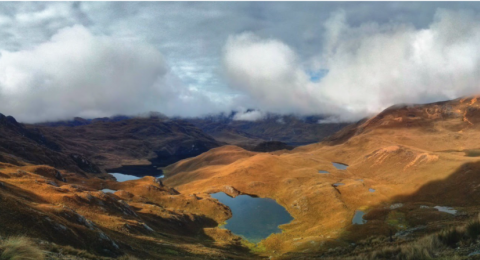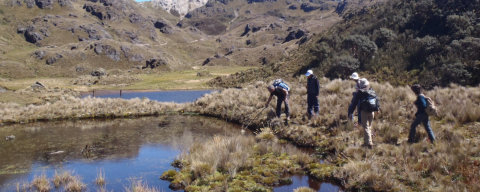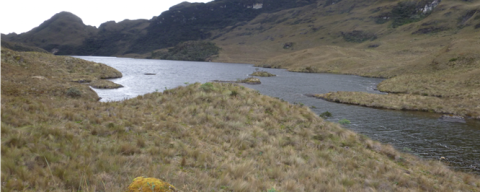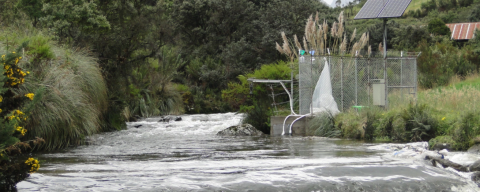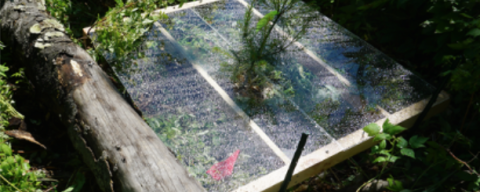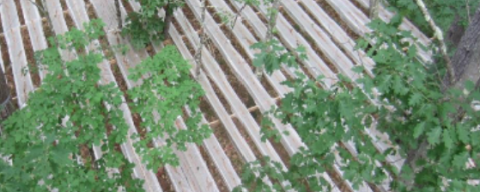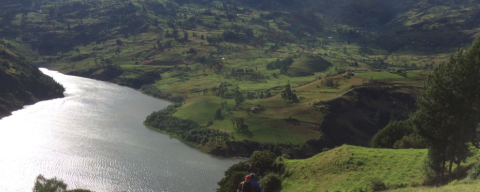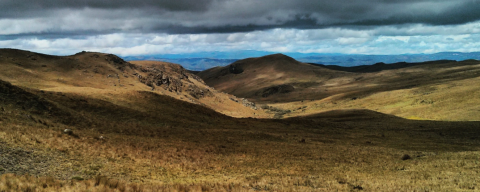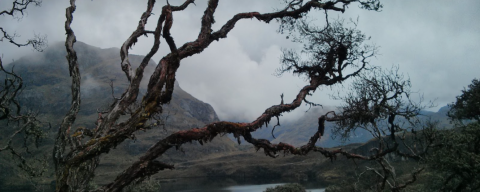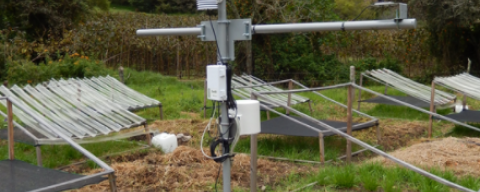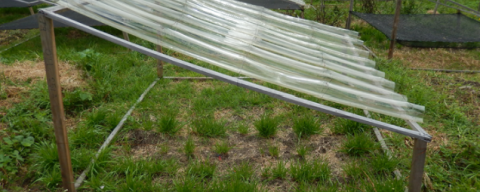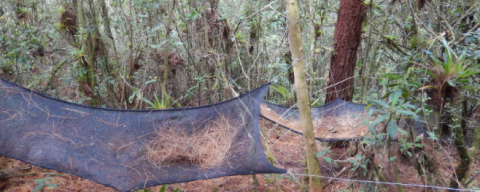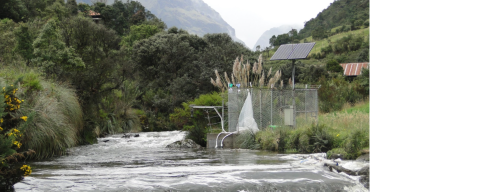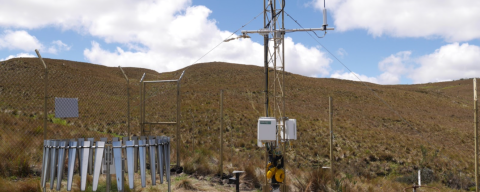AWESOME (Andean-Amazonian Watershed Experience: Exploring Sustainability of Mountain Ecosystems in Ecuador) is a U.S. National Science Foundation (NSF)-supported program designed to provide undergraduate and graduate students at UNH with unique opportunities to conduct collaborative international research in Ecuador, while learning about the diverse natural ecosystems, innovative approaches to watershed management, and the rich culture, history, and backgrounds of the Ecuadorian people and society.
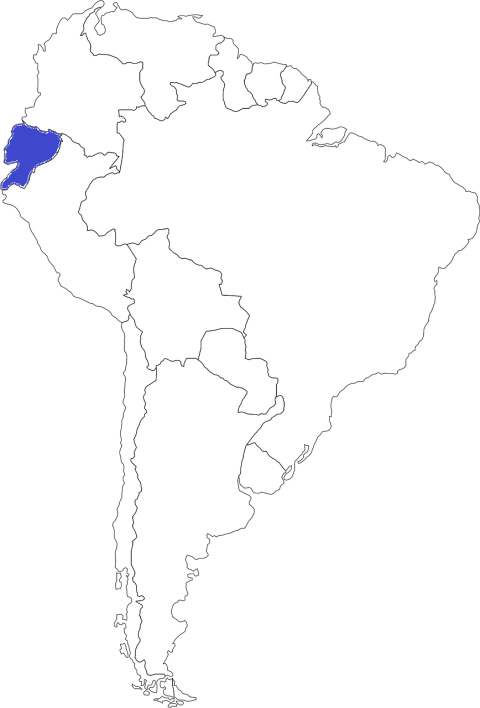
Ecuador is one of the most biodiverse countries in the world, straddling the equator and spanning a broad elevational gradient from the lowland tropical moist rainforests along the Amazon River (at 100 m in elevation) to the tropical alpine paramo in the Andean mountains (at elevation above 3000 m). Ecuador has diverse human populations, has 14 original nations, and a rich history and culture. This tremendous biological and cultural diversity offers an ideal environment for students to learn about complex issues related to the interaction between humans and their environment, and how to best link science with policy to promote more sustainable watershed management. Additionally, Andean-Amazonian watersheds provide critical ecosystem services to the human populations within the region, including hydrologic regulation, biogeochemical cycling, carbon storage, biodiversity, and cultural significance. However, the sustainability of these watershed functions is directly threatened by climate change and land use change, and finding ways to adapt to these global change drivers is a critical priority for the region.
Students participating in the AWESOME program will complete a 10-day Watershed Tour, starting in the Andean mountains and ending in the Amazonian lowlands, where they will visit different ecosystems and learn about management strategies and policies focused on improving the management of different ecosystem services and increasing their resilience to future change. Students will conduct their research projects in collaboration with local Ecuadorian scientists and students, at one of two different research sites, in partnership with three local universities:
Andean paramo (University of Cuenca & University of Azuay)
These ecosystems are located between Andean mountain forest and the snow line (the upper limit of life) ranging between 30000 and 5000 m in elevation. They provide ecohydrological services to the lowland population being the main water source for drinking water, irrigation and hydroelectric power generation for the main cities in South America (i.e. Bogotá, Quito, Cuenca, Lima). During the last decades local communities and municipalities are working together with scientists to improve the understanding of how these ecosystems work and how they are being impacted by global change. Nevertheless, additional information is needed to better conserve the ecosystems.
Amazonian tropical moist forest (Regional Amazon University Ikiam)
These ecosystems are located between the Amazon tropical forest and the Andean páramo (1500 to 2800 m in elevation) and have been extensively farmed and degraded over centuries, creating a rich and vast cultural landscape. Montane valleys were home to large human settlements before European colonization and are now the main cities in the country (eg. Quito, Riobamba, Cuenca, Loja).
How do you apply to A.W.E.S.O.M.E?
Fill out an A.W.E.S.O.M.E. student application and send it to Dr. Heidi Asbjornsen at heidi.asbjornsen@unh.edu. Submission deadline: Friday, November 10st, 2023.
Eligibility: Graduate student (any year) or undergraduate student with Junior or Senior standing at the time that the AWESOME international research experience in Ecuador will occur (in exceptional cases, undergraduate students may participate the summer following their graduation). All participants must commit to completing their research projects upon returning to the U.S.
Timeline (dates are tentative; to be confirmed by January 2023):
- May 22: Depart from Boston to Quito, Ecuador
- May 23 - June 1: Orientation and watershed tour (Guayacil - Cuenca - Quito - Tena)
- June and July: Students conduct independent field research (ranging from 3 to 8 weeks total)
Cost: Expenses related to travel, housing, food, and research activities will be covered by AWESOME for participating students. Undergraduate students may also consider applying for UNH’s IROP (International Research Opportunities Program) to supplement their funding.
Student research projects will connect to on one of the following five AWESOME central research themes:
Climate and land use change are impacting the carbon cycle in the andean ecosystems, increasing decomposition which is causing changes in Dissolved Organic Carbon (DOC), CO2 and Methane export. There has been a long history of interest in DOC in tropical regions (since the 1970s with work on the Rio Negro and tropical white sands soils), with wide swings in understanding of what “tropical streams” typically contain in terms of DOC. With our combination of paramo sites, Andean headwaters of the Amazon, Forest in Puerto Rico and more lowland Amazonian headwater sites, we have an excellent opportunity to contribute to understanding the drivers of spatial and temporal variability in the DOC of tropical streams and rivers. In addition, the unique data that we have about gas fluxes (using eddy covariance tower) in paramos permits us to explore how dry and wet conditions impact CO2 exchange. This can be also complemented with the carbon stock survey in the humic soils and native species of tussock grasses (pajonales).
Stream DOC integrates watershed soil C dynamics, hydrologic flow paths, and the role of deeper mineral soil sorption/desorption reactions. As it moves downhill, DOC-laden stream water provides a valuable water resource for cities. But it also poses a significant public health hazard due to the high levels of metals that are associated with DOC, and the disinfection byproducts produced upon chlorination of DOC-rich water. We thus link soils, river networks, and people in very direct and easily understood ways when we study stream DOC.
Possible Themes for Student Research Projects
- Concentration-discharge analysis across sites (Amazon to Andes)
- How does the DOC change over time?
- How is DOC related to terrestrial productivity?
- How is DOC influenced by geophysical characteristics
- Below and aboveground carbon stocks estimation through soil and vegetation sampling and / or remotely sensed-based techniques.
- Changes in aboveground biomass through drought-induced experiments in páramo vegetation.
Faculty participants:
- Bill McDowell – University of New Hampshire – Dept. of Natural Resources and the Environment
- Wil Wollheim – University of New Hampshire – Dept. of Natural Resources and the Environment
- Jorge Celi – Universidad Regional Amazónica – IKIAM – School of Earth and Water Sciences
- Patricio Crespo - University of Cuenca – Department of Hydrologic Resources & Environmental Sciences
- Pablo Quichimbo - University of Cuenca – Faculty of Agriculture and Livestock Sciences
- Galo Carrillo - University of Cuenca – Department of Hydrologic Resources & Environmental Sciences
Climate change forecasts predict that the Andean-Amazonian region will likely experience an increase in the frequency and duration of drought. Given that droughts were historically rare in the region, future droughts have the potential to cause major disruptions to both paramo and rainforest ecosystems, which will affect the sustainability of water resources and other ecosystem services. This AWESOME research theme seeks to understand the impacts of drought on tropical rainforest and paramo ecosystems and to assess the capacity of different ecosystem components (e.g., plants, microbes, soils) and processes (e.g., productivity, hydrology, nutrient cycling) to adapt to and recover from moisture stress. A rainfall exclusion experiment will be established at the two field sites in January 2022 to simulate a once-in-a-century drought. Students will have an opportunity to collect data on how particular ecosystem components and processes of interest are altered in response to the drought during the summer field season. A nitrogen addition experiment may also be included as part of the study to assess the interactive effects of moisture stress and nutrient availability on ecological response. A central question being asked by the AWESOME research team is: What are the feedbacks between the aboveground plant community and the belowground microbial community in response to drought and N addition, and how do these feedbacks scale up to affect ecosystem processes and potential shifts in species composition and plant functional types (e.g., grasses vs. shrubs)? While work on this topic has been conducted on other ecosystems (e.g., arctic tundra, temperate forests/grasslands/savannas), very little is known about the response of paramo and rainforest understory communities to these global change drivers.
Possible themes for student research projects are centered around the effects of drought (and potentially N limitation) on different ecosystem components, including (but not limited to):
- Plant species composition, plant growth and mortality
- Plant-microbe interactions (e.g., mycorrhizal dynamics)
- Microbial diversity, community composition, and function
- Plant functional traits (e.g., foliar, roots)
- Nutrient and carbon cycling
- Root dynamics
- Plant physiological responses
- Carbon cycle (e.g., soil respiration, plant growth and productivity, soil organic matter, decomposition)
Faculty participants:
- Heidi Asbjornsen – University of New Hampshire – Dept. of Natural Resources and the Environment
- Pablo Borja – University of Cuenca – Department of Hydrologic Resources & Environmental Sciences
- Aldemar Carabajo – University of Cuenca – Department of Hydrologic Resources & Environmental Sciences
- Jorge Celi – Universidad Regional Amazónica – IKIAM – School of Earth and Water Sciences
- Mark Ducey – University of New Hampshire – Dept. of Natural Resources and the Environment
- Jessica Ernakovich – University of New Hampshire – Dept. of Natural Resources and the Environment
- Serita Frey – University of New Hampshire – Dept. of Natural Resources and the Environment
- Jeff Garnas – University of New Hampshire – Dept. of Natural Resources and the Environment
- Ximena Palomeque – University of Cuenca – Faculty of Agriculture and Livestock Sciences
- Pablo Quichimbo - University of Cuenca – Faculty of Agriculture and Livestock Sciences
- Rolando Célleri - University of Cuenca - Dept. of Water Resources and Environmental Sciences
Tropical regions are considered a global priority for restoration, due both to the ongoing impacts on all ecosystems as well as for their potential to conserve biodiversity and mitigate climate change. In regions such as the Tropical Andes, a growing number of restoration initiatives have been implemented in the past decades. However, most of them lack a sound scientific base, a robust experimental design, or a standardized monitoring over time. The overarching goal of this working group is to produce new knowledge to help advance the practice of ecological restoration and record the effects of restoration initiatives over long periods of time.
We center monitoring how given plant species respond to different scenarios of degradation and how they modify the biological and physical environment over time.
Possible Themes for Student Research Projects
- Effects of different tree shelters on the survival and growth of native woody species
- Effects of different light regimes on the growth and vigor of native woody species
- Regeneration of native flora under managed Pine plantations
- Changes in soil-water movement after restoration
- Responses of native woody seedlings to different experimental microclimates
Faculty participants:
- Antonio Crespo - Universidad del Azuay, Native Plant Lab
- Elizabeth Ochoa - Universidad del Azuay, Environmental Engineering Department
In a place as biodiverse as Ecuador and with such an amazing variety of habitats and bioclimatic zones, the potential for researching fascinating ecological interactions is virtually endless. This working group focuses primarily on woody ecosystems, potentially ranging from the high altitude Polylepis forest that dominates areas of the paramo ecosystem to the lowland Amazon tropical rainforest. We are particularly interested in 1) how biotic and abiotic threats to woody ecosystems influence water quality and availability; 2) the diversity, distribution and impacts of non-native plants, insects, and pathogens; and 3) how public perception of native and non-native woody planted and/or naturally dominant or spreading species influences ecosystem health and restoration efforts.
Possible Themes for Student Research Projects
- Responses of native and non-native trees and tree-associated communities to natural or experimental drought (and other abiotic stressors)
- Rates of colonization of non-native plants by native and non-native insects
- Impacts of woody plant invasion and spread on water dynamics and hydrology
- Island biogeography/meta-community structure in naturally discrete (e.g., Polylepis forests) and/or remnant forest patches
- Human and/or cross-cultural perceptions of native and non-native woody vegetation
Faculty Participants:
- Jeff Garnas – Department of Department of Natural Resources and the Environment – University of New Hampshire. (Coordinator - Ecological Interactions Working Group).
- Francisco Villamarín, Ikiam, Ecuador
- Boris Tinoco, UDA, Ecuador
- Pedro Astudillo, UDA Ecuador
- Jorge Celi, Ikiam, Ecuador
- Verónica Gallardo, Ikiam, Ecuador
This working group focuses on supporting investigation of watershed and environmental governance in Ecuador. An emphasis for the group is to foster interdisciplinary collaboration and consideration of how social, natural, and physical science insights can be integrated to support on-the-ground natural resource management as well as advance scientific understanding of water-environmental concerns across Ecuador’s diverse social and ecological landscapes.
Ecuador has been a global leader in collaborative watershed management and in the development of economic instruments to support conservation and the management of water resources. In particular – “water funds” have been established in many regions of the country to provide economic incentives to individuals and communities to support conservation and the maintenance of key hydrologic and ecological resources. How effective these economic approaches are in achieving environmental and social goals related to water management is a key question for Ecuador as well as globally.
Ecuador is one of the only countries in the world to declare water as a human right in its constitution. Nonetheless, ensuring safe and consistent access to water for humans as well as the environment is a challenge. Water governance in Ecuador is multi-faceted and involves federal, state, and local governmental actors, and private sector actors as well as community groups have also been deeply engaged in water management. Water funds reflect the diverse social, economic, and ecological landscapes across Ecuador. They have worked in different ways with all levels of government, water-reliant businesses and utilities, non-governmental and community organizations, as well as international environmental groups and foundations. As many of these funds focus on environmental conservation, the scientific community has also played a key role providing input and guidance to these funds and their management partners. This complexity as well as the importance of water funds within broader efforts to manage and govern water resources and conserve critical environmental areas makes Ecuador an ideal locale to develop research on water governance and economic incentive programs.
Possible Themes for Student Research Projects
- Analysis of institutional arrangements and the organization of water governance in Ecuador – with a focus on the role of water funds and economic incentive approaches.
- Analysis of role of federal/state/local government actors and community organizations / NGOs in water funds and natural resource management
- Analysis of how existing conditions and changes in human and natural ecosystems affect policies and natural resource management approaches
- Analysis of the role of international organizations (non-governmental organizations (NGOs), foundations, multilateral funding agencies) in water governance and economic incentive programs
- Investigation of different economic incentive programs and assessment of their social and economic effectiveness
- Analysis of the use of different types of scientific information (natural, physical, social science) in decision making related to water funds and water governance
- Participatory action research on water management with local communities
- Ecosystem trade-off analysis linked to different human, aquatic, and terrestrial ecosystems
Faculty participants:
- Tom Safford – Department of Sociology – University of New Hampshire. (Coordinator - Water Governance Working Group).
- Heidi Asbjornsen – Department of Natural Resources and the Environment – University of New Hampshire.
- Catherine Ashcraft – Department of Natural Resources and the Environment – University of New Hampshire.
- Jorge Celi – Universidad Regional Amazónica - IKIAM – School of Earth and Water Sciences.
- Byron Maza Rojas – Universidad Regional Amazónica - IKIAM – School of Earth and Water Sciences
- Rolando Célleri - University of Cuenca - Dept. of Water Resources and Environmental Sciences
- Javier Avila - University of Cuenca - Dept. of Water Resources and Environmental Sciences & Faculty of Psychology
- Adriana Mora - Catholic University of Cuenca
-
Cristian Zhimnay Valverde - Research Group on Population and Sustainable Local Development - University of Cuenca
-
Aracely Estefanía Rojas Lazo - Research Group on Population and Sustainable Local Development - University of Cuenca
Faculty Advisors
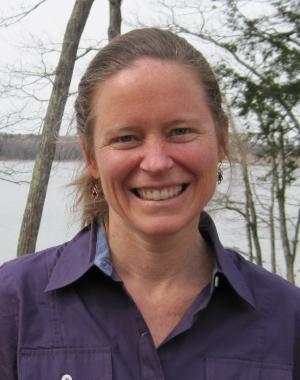
Heidi Asbjornsen
Professor of Ecosystem Ecology and Ecohydrology
University of New Hampshire
Email: Heidi.asbjornsen@unh.edu
Website: https://www.ecohydro.sr.unh.edu/; https://colsa.unh.edu/person/heidi-asbjornsen;
Research interests: My primary research interests focus on assessing the resilience of diverse ecosystems to climate change (especially drought) and the capacity to enhance the adaptive capacity of ecosystems through management and policy tools, with the goal of enhancing the sustainable production of ecosystem services that are critical to support both healthy ecosystems and societal well-being.

Serita Frey
Professor, Soil Microbial Ecology
University of New Hampshire
Email: serita.frey@unh.edu
Website: http://unh.edu/freylab/
Research interests: Our research focuses on how human activities are impacting terrestrial ecosystems, with an emphasis on soil biota and nutrient cycling processes. We are specifically interested in how anthropogenic stressors (e.g., climate change, nitrogen deposition, agricultural management, invasive species) affect the composition and diversity of soil microbial communities and microbial-mediated carbon and nitrogen cycles. We work at the interface between ecosystem science, microbial ecology and global change biology, combining microbiological methods with stable isotope analysis and a variety of soil physical and chemical approaches to examine structure-function linkages.
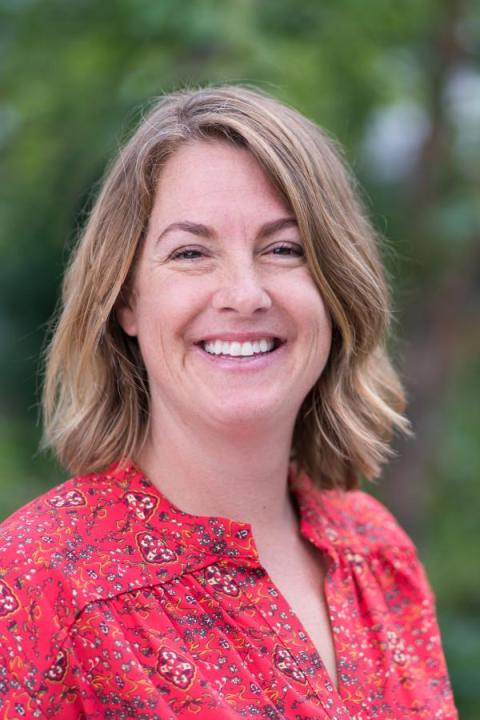
Jessica Ernakovich
Assistant Professor, Microbial Ecology (with specialization in tundra systems)
The University of New Hampshire
Email: jessica.ernakovich@unh.edu
Website: https://mypages.unh.edu/jernakovich
Research interests: Our lab aims to understand how disturbance from environmental change—ranging from agricultural management to permafrost thaw—affects the function of ecosystems, with a specific emphasis on greenhouse gas production, soil organic matter production, and nitrogen mineralization from soils. We achieve this through collaborative science investigating how microbial communities interact with and function in their physical, chemical, and biological environment using a mixture of science tools—including high-throughput sequencing of nucleic acids and tracing of chemical transformations with stable isotopes—in a team that fosters a passion for discovery through support and inclusion of diverse people, backgrounds, perspectives, and ideas.
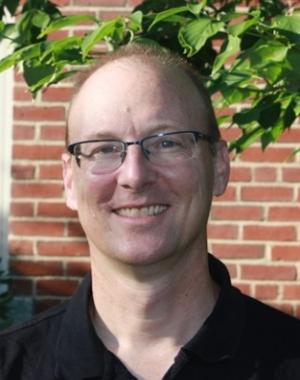
Wilfred Wollheim
Associate Professor, Ecosystem Ecology (emphasis on aquatic)
The University of New Hampshire
Email: wil.wollheim@unh.edu
website: https://wsag.unh.edu/
Research Interests: My research centers on the ability of aquatic ecosystems at watershed scales (i.e. river networks) to regulate downstream material fluxes and water quality. Areas of interest include the fate of anthropogenic nitrogen inputs to surface waters, the contribution of river networks to carbon cycling, and the fate of macro and micro-plastics. I particularly emphasize how land use, climate, and hydrological changes affect these processes using both field and modeling approaches.

Jeff Garnas
Associate Professor, Forest Ecosystem Health
Email: jeff.garnas@unh.edu
website: http://mypages.unh.edu/garnaslab
Research Interests: My research focuses on understanding how ecological interactions structure forest ecosystems and influence resiliency. I am particularly interested in exploring how these interactions change in the face of anthropogenic climate change and as a consequence of biological invasion. I use a wide variety of tools to address key questions of relevance to population and community ecology of forests, including experimental and observational field studies, simulation modeling, and molecular/genomic methods. My work to date has primarily taken place in native and plantation forests of North America, South Africa, and Central America.

Tom Safford
Associate Professor of Sociology
University of New Hampshire
Email: Tom.Safford@unh.edu
Website: https://cola.unh.edu/person/thomas-safford
Research Interests: I am an environmental sociologist whose research focus on 1) the organizational dimensions of water and environmental management, 2) social factors affecting environmental attitudes and beliefs, and 3) the role of different types of science, scientists, and expertise in shaping natural resource management. I have conducted research on social-environmental concerns in New England and the U.S. Pacific Northwest as well as in Brazil and Ecuador in South America. A current focus for me is investigating how social, economic, and ecological data are collected, integrated, and applied to inform environmental decision making.

Catherine Ashcraft
Assistant Professor
University of New Hampshire, Environmental Policy and Planning
Email: catherine.ashcraft@unh.edu
Website: https://mypages.unh.edu/epps
Research interests: I am interested in the human dimensions of ecological systems, particularly in how we can negotiate and design policies for managing freshwater and climate systems to be more just and sustainable. Recent collaborative research from my lab focuses on decision-making about dams in New England, decision-making about payment for hydrological services programs in Veracruz, Mexico, and implementing justice in climate adaptation policies.
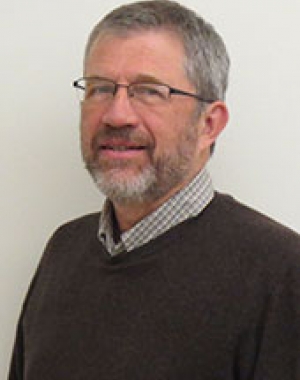
Bill McDowell
Professor
University of New Hamsphire, Environmental Science
Email: bill.mcdowell@unh.edu
Website: Full profile: FindScholars@UNH
Research Interests: Research in the McDowell lab focuses on understanding controls on biogeochemical cycles in streams, forests, and watersheds. Specifically, we study long-term changes in the water quality of forested, suburban, and urban watersheds in both temperate and tropical biomes. Our primary long-term study sites include the Lamprey River and other suburban watersheds in southern New Hampshire, the Luquillo Experimental Forest and urban sites in Puerto Rico, and forested watersheds in New England, the Czech Republic, and Siberia. Understanding the impact of people on water quality, especially impacts on the nitrogen cycle, is a long-term goal in many of our research projects. Primary funding comes from the National Science Foundation, the USGS, the USDA, and other Federal agencies.
Aldemar Carabajo-Hidalgo
PhD candidate of Ecology, Natural Science and Plant Physiology program
University of Barcelona
Researcher in the project: The ecohydrologic functions of Polylepis forests within the Andean páramo and their resilience and vulnerability to climate change
University of Cuenca
Email: hidalgoaldemar@gmail.com
Research interests: In general terms, my research interest is to understand the ecology and physiology of the forests, their interactions with their environment, and how these interactions are affected by the current climate change at the higher altitude and the higher latitude ecosystems on Earth, since the effects of climate change are stronger in the extremes.
Ximena Palomeque
Professor, Seeds Ecology, Plant Ecology and Restoration Ecology
University of Cuenca
email: ximena.palomeque@ucuenca.edu.ec
Research interests: My research interests focus on how seeds and plants respond to environmental conditions, mainly how drought and warmer temperatures could modify plant diversity in natural ecosystems in the highlands with the aim to explore species better adapted to the new conditions due to climate change.
Patricio Crespo
Professor, Andean Hydrology, Hydrogeochemistry
University of Cuenca
email: patricio.crespo@ucuenca.edu.ec
website: https://www.researchgate.net/profile/Patricio-Crespo-4
Research interests: My research interest is related to Ecohydrological processes of Andean Ecosystems, using hydrometric and tracer techniques. Mainly how climate and land use change could modify the water and carbon balance in paramo and cloud forest ecoystems.
Rolando Célleri
Professor of Hydrology and Water management
University of Cuenca
Email: rolando.celleri@ucuenca.edu.ec
Website: https://www.ucuenca.edu.ec/idrhica/index.php/en/staff/professors/rolando-celleri/
Research interests: I do research in water resources in the Tropical Andes to understand hydrological and hydrometeorological processes as well as the impacts of global change. My first research interest is to advance the understanding of the hydrological cycle in Andean ecosystems, from rainfall formation to runoff generation, including the role of vegetation on the water cycle. My second research interest is to reduce the vulnerability of tropical Andean communities to climate variability and change as well as land use change. The open question is how to achieve the SDGs given our changing conditions; and for this we have to understand our socio-ecological systems and implement tools (e.g. water funds) to address the most pressing issues.
Pablo Quichimbo
Professor of Soil Science and Plant Nutrition
University of Cuenca
Email: pablo.quichimbo@ucuenca.edu.ec
Website: https://www.researchgate.net/profile/Pablo-Quichimbo
Research interests: The research of biogeochemical processes in soils is my main area of interest. For which I have investigated soils, studying their different properties - morphological, physical, chemical and biological - in both natural (montane forests and páramos ecosystems) and anthropized (agricultural production areas) environments in the Andes, particularly in southern Ecuador. I am also interested in knowing how to integrate the scientific knowledge of the soil-plant relationships with the local knowledge of the Andean farmer oriented towards a sustainable management of the soils in the Andes.
Javier Avila
Professor of Development
University of Cuenca
Email: javier.avila@ucuenca.edu.ec
Website: https://www.researchgate.net/profile/Javier-Avila-Larrea
Research interests: My interests are related to Integrated Water Resources Management. We must bear in mind the different types of benefits that water resources provide as well as the impacts generated by the multiple actors in terms of the efficiency in their allocation over a given territory. For this reason, the management of sustainability is a key topic whose final objective is the reproduction of the vital cycles of both population and ecosystems. My research is currently focused on irrigation systems in mountain basins and their influence on the achievement of the Sustainable Development Goals through the modeling and sustainable planning of resources. Here, interdisciplinary participation is essential to fully address the problem and as a result generate a solution according to the specificities of the territories.
Galo Carrillo-Rojas
Associate Professor of Environmental Sciences
University of Cuenca
Email: galo.carrillo@ucuenca.edu.ec
Website: https://www.ucuenca.edu.ec/idrhica/index.php/es/personal/profesores/gal…
Research Interests: I am a chemical engineer with a PhD in natural sciences and environment. Some topics of my research are: (i) thermodynamics in natural ecosystems, (ii) energy and mass balance (with ground-level and remote-sensing techniques), (iii) carbon cycle and (iv) land-surface processes modelling. I have conducted research projects in the tropical mountain regions of South Amercia, specifically in the Páramo ecosystem of the highland Andes and also in the cloudy mountain forest of Ecuador. I am interested in the effects of climate & land-use change in the Andes and the role of carbon and energy balance on this region.
Pablo M. Borja
Occasional Professor of Soil classification and Mapping and Soil Conservation
University of Cuenca, Faculty of agricultural sciences
Email: pablo.borja@ucuenca.edu.ec
Website: https://www.researchgate.net/profile/Pablo-Borja
Research interest: My main research interest focuses on various aspects of soil degradation and conservation. Other interests include ecological restoration focused on the soil system and pedometrics.
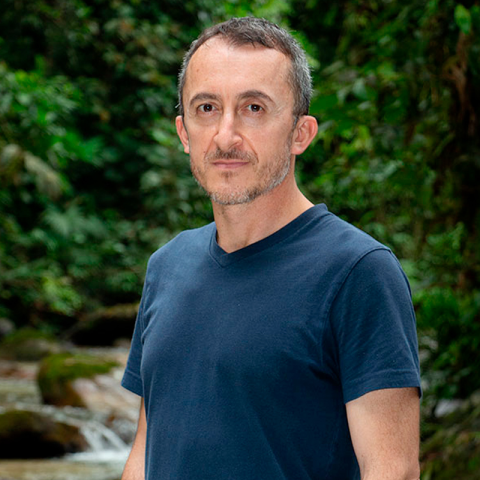
Jorge Celi
Professor (Aguatic ecology, ecohydrology, governance)
Universidad Regional Amazónica - IKIAM – School of Earth and Water Sciences
email: jorge.celi@ikiam.edu.ec
website: https://ikiam.edu.ec/app/index.html#/biografia/47
Research interests: My main goal is to understand ecological, biogeochemical and ecohydrological processes in aquatic ecosystems, and their interaction with humans to generate recommendations to promote sustainable practices. I work on diverse ecosystems in Ecuador, including lakes, rivers and wetlands in the highlands and lowlands, and am especially interested in the ecosystem services that these environments provide, the effects of stressors, like climate change, invasives or land use, on them, and their relationship with the levels of governance of communities and governments involved.
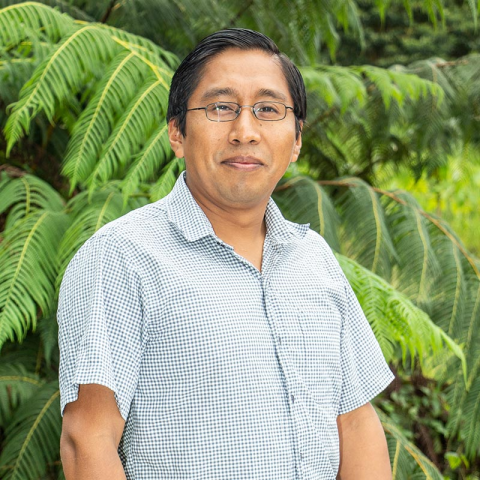
Byron Maza
Professor (environmental & resources economics, integrated management of water resources, governance)
Universidad Regional Amazónica - IKIAM – School of Earth and Water Sciences
email: byron.maza@ikiam.edu.ec
Research interests: My research interest is studying the carbon, biomass and tree diversity along the Altitudinal Gradient in an Evergreen Andean - Amazonian Forest, Ecuador. Also, I am interested in the governance of the water funds.
Pedro Astudillo
Professor
Universidad del Azuay
email: pastudillow@uazuay.edu.ec
website: https://www.researchgate.net/profile/Pedro-Astudillo-5
Research interests: I am interested in ecology applied to High-Andena fauna, especially Andean birds. More specifically, I use structural characteristics of páramo landscape to explore effects on a bird community and bird populations. Besides, I explore different aspects of andean fauna such as distribution, new reports and any novel diversity pattern.
